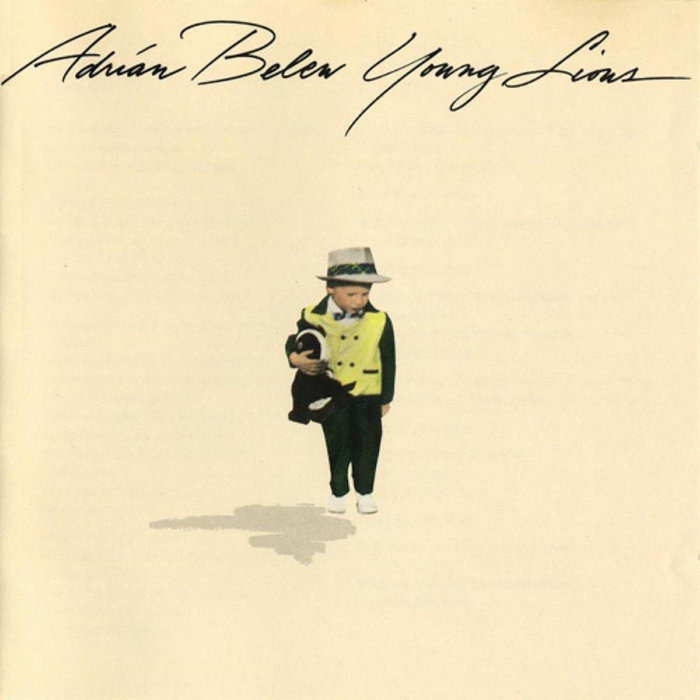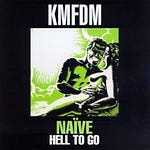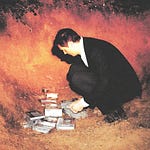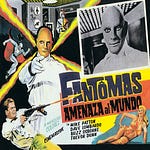Ever wonder what happens when a Kentucky teenager gets mono and ends up revolutionizing guitar playing?
That’s exactly how Adrian Belew’s story starts. Here’s a guy who was supposed to be banging away on drums in his high school marching band, but a bout of mononucleosis forced him into bed with nothing but a guitar and a head full of Hendrix. Without YouTube tutorials or tabs to guide him, young Robert Stephen Belew (yeah, Adrian’s not even his real name)started making these wild, otherworldly sounds that would eventually catch the ear of Frank Zappa’s chauffeur at a Nashville dive bar.
But let’s fast-forward to 1990. By then, Belew had already carved out this incredible career as rock’s ultimate utility player—the guy who could make David Bowie sound dangerous again, help King Crimson stay weird, and turn Talking Heads into something even more brilliantly neurotic. Then he drops Young Lions, and suddenly this prog-rock wizard decides he wants to write pop songs.
What’s that sound? It’s the collective confusion of every prog fan who expected another experimental odyssey and got hit with what sounds like ELO meets the New Pornographers.
The Album That Nobody Expected
Young Lions is the musical equivalent of finding out your serious, academic friend also happens to be an incredible dancer. You know Belew can make his guitar sound like a rhinoceros having an argument with a helicopter—because yes, that’s actually a thing he does—but nobody saw these pristine pop hooks coming.
The album opens with its title track, this pulsating stomp that feels like “bonfire parties and hunting predators” all rolled into one. It’s got this jungle-ish rhythm that makes you wonder if Belew was channeling some primal energy, complete with what one fan described as bells on its ankles and sounds that could be “some genius machination Belew does with pedals and pixie dust”.
Then “Pretty Pink Rose” kicks in, and suddenly David Bowie’s there, sounding more alive than he had in years. This was during Bowie’s Sound + Vision tour, where Belew was serving as musical director, and you can hear why these two clicked. The song uses William Burroughs’ cut-up technique for lyrics—“She’s the anarchist crucible flying in the face of the despot cannibal”—but somehow it all works because Belew’s got this perfect balance between Roy Orbison’s croon and David Byrne’s quirk.
When Weird Becomes Wonderful
Here’s what makes Young Lions fascinating: Belew takes all his progressive rock sophistication and smuggles it into three-minute pop songs. Songs like “Looking for a UFO” sound like they could’ve been ELO B-sides, complete with that classic lush production, but then you dig deeper and realize he’s using chords and unexpected changes that completely shift the emotional landscape mid-song.
It’s like watching a kaleidoscope—everything shifts color and mood because of these clever chord progressions that were common in ’70s and ’80s pop but had started disappearing by 1990. While everyone else was heading toward the four-chord simplicity that would dominate the ’90s, Belew was celebrating harmonic complexity disguised as radio-friendly rock.
The drums? Pure Belew genius. He’s switching snare sounds mid-song on “You’re Not Alone”—which is illegal according to the music police, but somehow works perfectly. He’s layering percussion so seamlessly you don’t realize you’ve gone from a full drum kit to just toms until after it happens. And through it all, there’s this organic, performed quality that keeps everything from feeling sterile despite all the layering.
The Prophet and the Pop Star
Then there’s “I Am What I Am,” featuring Prophet Omega, a Nashville radio evangelist whose decades-old sermon recordings became underground currency among musicians in the ’80s. Belew turned this into a four-minute art piece that sits right in the middle of the album like some cosmic intermission.
It’s the kind of move that could’ve derailed everything, but instead it adds to the album’s sense of unpredictability. You never know if the next track will be David Bowie showing up to snarl about drugs on “Gunman,” or a Traveling Wilburys cover that sounds like Jeff Lynne’s fever dream.
The Tragedy of Great Timing
Here’s the heartbreaking part: Young Lions came out in May 1990, just as the music world was about to shift dramatically. This was right before grunge would make everything sound deliberately rough around the edges, before alternative rock would make Belew’s sophisticated pop sound almost anachronistic.
Even with Bowie’s star power on two tracks, the album couldn’t find its audience. Progressive rock fans were confused by the pop hooks. Pop fans didn’t know what to make of the weird guitar textures and complex arrangements. It’s the classic story of being too early for one audience and too late for another.
But maybe that’s what makes it special now. Listening to Young Lions in 2025 feels like discovering a secret history of what pop music could have been—what happens when someone with Belew’s technical mastery and creative vision decides to write songs you can actually hum along to.
The Sound of What If
What strikes you most about Young Lions is how timeless it sounds. This isn’t trapped in 1990 production choices or weighed down by era-specific sounds. These could be lost ELO tracks or forgotten gems from some alternate timeline where pop music stayed complex and interesting.
“Men in Helicopters” tackles environmental and political themes without being preachy, asking questions instead of demanding answers. “Phone Call from the Moon” explores isolation and connection in ways that feel even more relevant in our hyperconnected age. And through it all, Belew’s guitar work provides this constant sense of controlled chaos—structured enough to serve the songs, wild enough to keep you guessing.
The album’s biggest strength might be how it makes complexity sound effortless. You can put this on at a party and people will nod along to the hooks, but slip on headphones later and discover layers of detail that reveal new secrets with each listen.
So here’s the question: In a world where every pop song uses the same four chords, why aren’t we talking more about albums like Young Lions? Why did we let songwriting get so much simpler when guys like Adrian Belew were showing us how to keep it interesting?
Maybe it’s time to give this overlooked gem the attention it deserved thirty-five years ago. Sometimes the best discoveries are hiding in plain sight, waiting for the right moment to make perfect sense.
Songs in this Episode
Intro - Young Lions
22:17 - Pretty Pink Rose
29:30 - Looking For A UFO
38:44 - Heartbeat
Outro - Gunman















